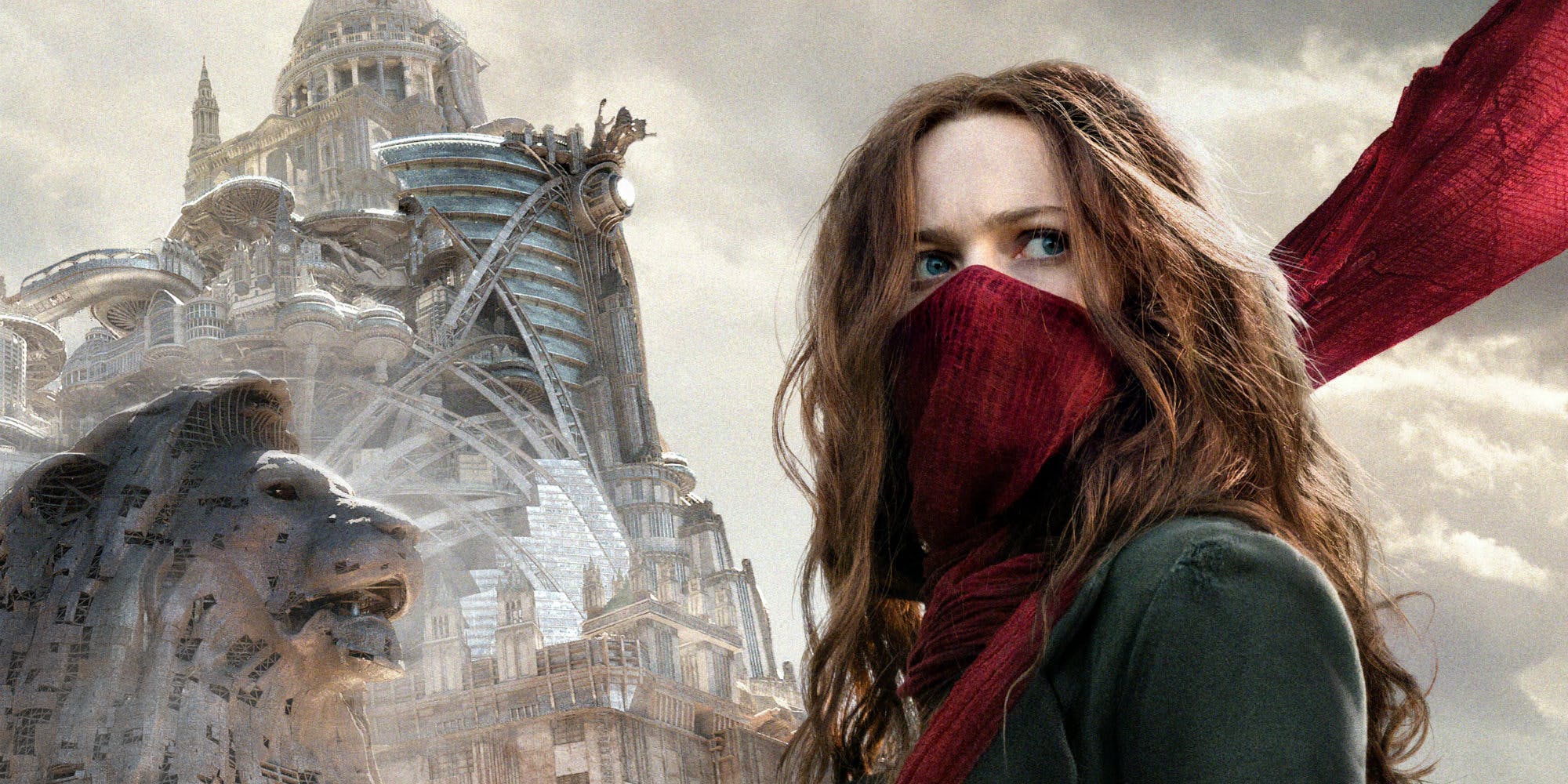I don’t like bad mouthing movies. Not my dish. This site is a work of love, an ode to glorious movies, not a chasm of chaos and negativity. (If anyone can give me a synonym of negativity that begins with CH I will give you my childhood millennium falcon. No, actually, I will not. But I’ll let you look at it.) Oooh, what about churlishness? Does that sort of work? Anyway, I can count on one hand the number of negative movie discussions I’ve done on this site. (The one popping to mind right now is Warcraft, and how how that movie deserved it.) But after just coming out of Mortal Engines, I’d like to discuss said movie without the kid gloves. And really? I have no problem Mortal Engines specifically. Just generally specifically.
A Little Mortal Engines History
In order to properly discuss the Mortal Engines movie, we really need to back up a little bit. Philip Reeve originally wrote Mortal Engines as a science fiction novel for adults. But after numerous rejections from various publishing companies Reeve decided to dial back large swaths of the political detail, as well as dropping several characters, in order to make it a more kid friendly novel. It should also be noted that originally, Reeve had written his book as an alternate universe set in the 1900s. But the work to explain the various divergence points in history was just too much exposition.
Peter Jackson – of the Lord of the Rings movie fame – purchased the rights to the book back in 2009, but the film languished as Jackson was working on a number of movies including The Hobbit trilogy. (Cough, which was an awful idea, cough. Just saying.) Peter Jackson, Fran Wash, Philippa Boyens (the standard Wingnut collaboration trio) crafted (probably the wrong word there, sorry about that. Maybe slung, hashed, or mailed in, would have worked better?) the screenplay, and then worked with Christian Rivers – a long time collaborator of Peter Jackson’s – to direct.
And generally speaking, Peter/Fran/Philippa always take the ultra-literal approach to screenplay writing. Their one innovation in the Lord of the Rings was the epiphany that they needed to “follow Frodo.” Well, ok. Clever… I guess? And Jackson’s King Kong? More ultra-literal-ness incarnate. Yes, you are guessing correctly, I’m probably the one person, in all of geek-dom, that isn’t a fan of Peter Jackson. I do think his LOTR trilogy is a gorgeous envisioning of one of the greatest books ever written. But his overt cash-cowing of the Hobbit into three movies? Wrote him off in my mind. That, and then his uninspired work on Kong. What else has he done worth reviewing? I personally believe that it is his integral work with WETA that made a name for himself. The technology of the visuals. But as a writer and director? He’s uninspired. (Which, I will say, is better than I would do.) But as it relates to this movie specifically? P/F/P have taken a dialed children’s book idea and then dialed the ideas of it down even more.
If you haven’t seen the Mortal Engines movie or read the book yet, I’d jump down to my conclusions section so as to not spoil the movie. If you even care enough not to spoil it. And heck, this trailer basically tells you the entire story, so if you’d like to just spoil the movie yourself, watch this:
The Story of Mortal Engines Movie
As far as I can tell, the story is all about the Shaw family. It begins with Pandora Shaw (played by Caren Pistorius), an Old Tech historian, that searches the ruins of the world for old technologies and their historical relevance after the 60 minute war. The 60 minute war, apparently, refers to a global thermonuclear war that decimates the planet. But Thaddeus Valentine (played by Hugo Weaving of the Matrix and Lord of the Rings fame) is ultra interested in all of this cool technology that Pandora seems to be uncovering. (You mean he wasn’t interested in me for me?!?) And when Pandora, finds a Medusa (yes, I’m not making this stuff up) she knows that Mr. Anderson…. oh wait, sorry, I mean Thaddeus Valentine will do anything to get his hands on that technology. Including killing her, (oh and her husband David Shaw, according to the book anyway) which he does.
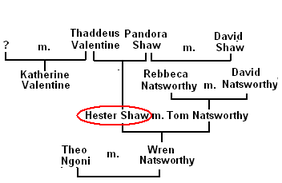
The movie doesn’t cover this, but Hester was just carved by her own father, Thaddeus Valentine. Pandora and Thaddeus apparently had a bit of a thing, and Hester was the result of that particular little dance. Now, Pandora’s daughter, Hester Shaw (played by Hera Hilmar) was cut in the face by Valentine’s sword, scarring her face the rest of her life. Fleeing for her life, Hester is saved by Shrike, a stalker.
A few years later, Hester Prynne, sorry, wrong story… Hester Shaw leaves to exact her revenge against Valentine, her father. Eventually she makes it to London, a massive traction city and stabs her father, but fails to kill him. She falls off the city. Valentine also sends Tom Natsworthy off the city to his “death” beside Hester. Tom and Hester find themselves being sold as slaves, only to be saved by Anna Fang, the leader of the anti-traction league. Anna, apparently having spoken to Pandora before her murder, knew that Hester was the key to stopping the Medusa. (Literally.) And thus her interest in saving Hester.
When Valentine gets the Medusa running, he sends London towards the walled city of the anti-traction league, in order to feed on the resources beyond the wall. But when Shrike decides to stop hunting Hester (someone, please explain why she was being hunted by him in the first place? I know she made a vow to become like him and then doesn’t… was that the only reason?), he gives her a locket given to her by her mother. Which, oh by the way, contains the key to shutdown the Medusa.
Following a huge air battle, reminiscent of Luke Skywalker’s attack on the Death Star (cough), Hester and Anna get to St. Paul’s. Anna Fang duels with Valentine, allowing Hester to go in and power down the Medusa and save the anti-tractionists, and the city.
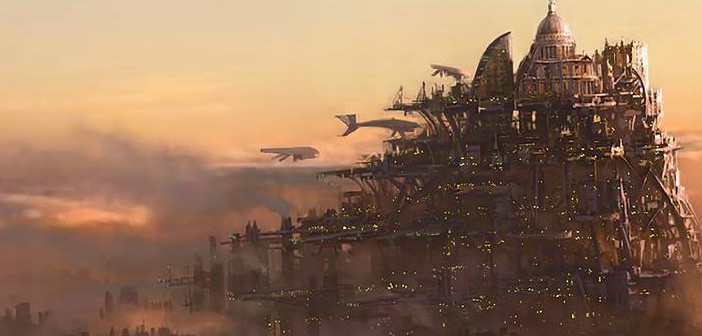
A Few Key Differences Between the Book and the Film
- Hester’s Scar – it was dramatically reduced in the film. Apparently, during the shooting of the film, they used a prosthetic, but decided it wasn’t “impactful” enough, and decided to digitally enhance Hester after the fact.
- The God’s of London – in the book, the people of London prayed to Disney characters of the past. But in the movie we have minions instead. Why? Because the film is produced by Universal, not Disney, that’s why.
- Anna Fang – the leader of the anti-traction league, was a cool character in four books, but they took her character to an eleven in the movie. Oh, and Valentine kills her in the movie, but she remains a significant player throughout all four books.
- They Aged Up the Actors – apparently, in the book, all the characters are significantly younger, and so in the movie, they aged up the characters to avoid disinterest of yet another teen dystopian movie.
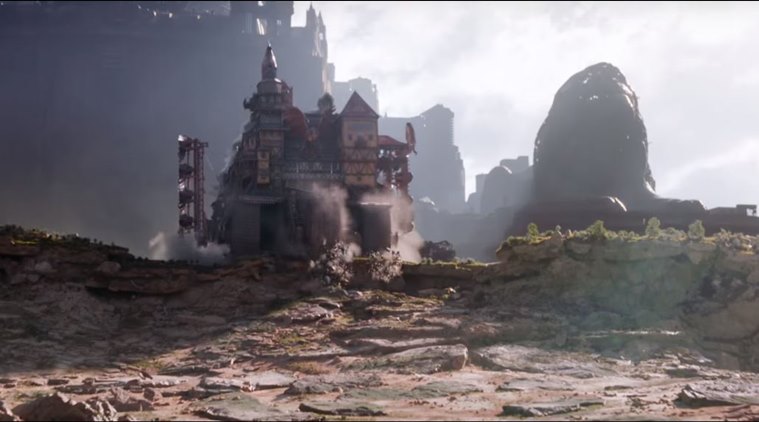
On The Flaws of Mortal Engines
The ideas of Mortal Engines is best as a Steam Punk Cosplay event at a comic con. Sure, they made a great kids book. But it is so stylized and fantastic in its own ideas that it is difficult to buy. I mean, cities, on wheels, chasing down other cities? The Physics alone of cities on wheels are hard enough to buy. They are so impossible that it made me discount the CG throughout.
Speaking of the CG, I would love to meet the art director of Mortal Engines and shake his hand. I’d purchase his original sketches gleefully. I’d love to interview her and ask how they achieved some of the designs of the world. But I literally would like nothing to do with WETA and the whole shop that pulled this movie together. Yes, it was a technical marvel. But it that’s all it was, a technical marvel with zero life in it. As Hester and Tom stood out on the bay of the airplane they rode in, and stared down at the cities and landscapes, all I could think about was the green screen they were standing in front of. Literally.
But worse? Worse, is the fact that this story is 100% regurgitated derivative. Think about it. Have you ever watched a movie about a poor outcast that came from the outer reaches to fight against an evil villain that has scarred you… taken your hand maybe, only to find out that he happens to be your father? Oh, and this father, who might have also built a giant death ray to blitz the final location of the outstanding rebels? And then, what does our hero do? He leads the resistance against his father on an air assault against this giant death ray in order to save the galaxy at the very last second. Is any of this at all sounding familiar?
I would love to read the adult version of Phillip Reeve’s original Mortal Engines. You know, the 1900’s version of the story. The one with all the intense politics and the added characters. I really do think, that on the page, this is a great idea. A story of a post apocalyptic world wherein the cities populations reenact the fight between the free range herds and the farms that started using barbed wire. Because, really, that is what this story is about. The politics of free grazing and the politics of fenced in farms. Which, doesn’t seem disinteresting to me at all. But to take a good idea, distill it down into its commensurate parts, just so as to make it edible to children? And then to take these ideas, and regurgitate them into a visual pastiche? A pastiche that has basically been done a million times over. Star Wars being only one of the times. (Harry Potter might be another, but I’m only on book 4 and I will not listen to your crap about that particular detail of my life.)
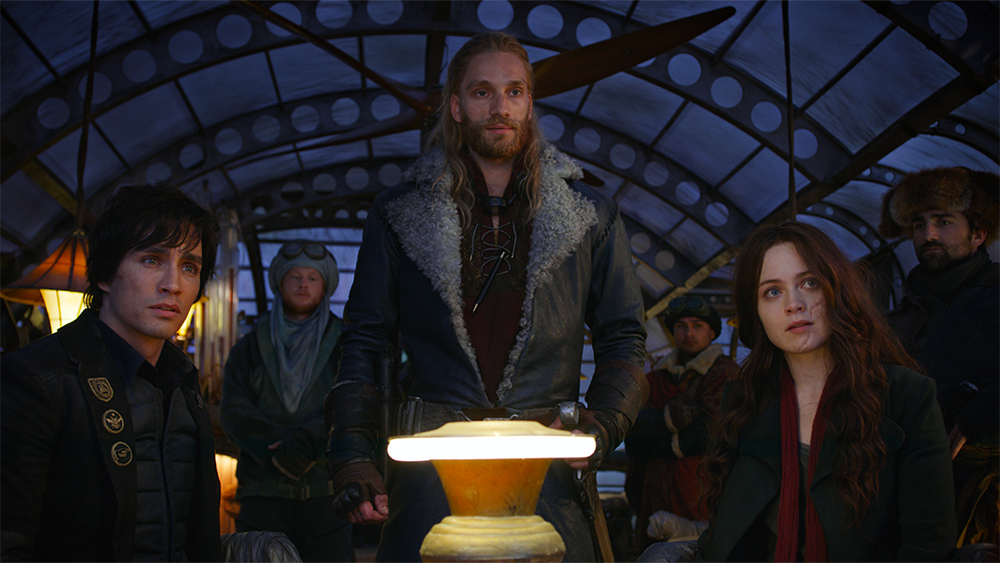
Final Thoughts on Mortal Engines
I REALLY wanted to like this movie. Honest I did. But I should have known. What with Jackson at the writing wheel, and over done CG controlling the rest… how could I have expected anything different? If only they had just added light sabers, it would have had that going for it. Or Monty Python…
Edited by, CY

